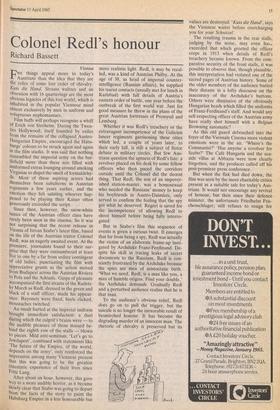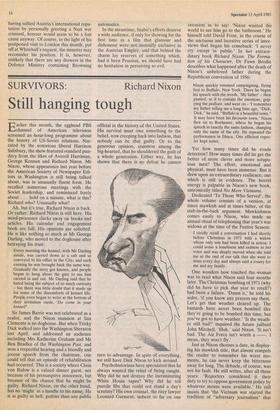Colonel Redl's honour
. Richard Bassett
Vienna
Fwe things appeal more to today's Austrians than the idea that they are the relics of some lost order of chivalry. Kuss die Hand, Strauss waltzes and an obsession with 16 quarterings are the most Obvious legacies of this lost world, which is inhabited in the popular Viennese mind almost exclusively by men in uniform and voluptuous nyphomaniacs.
Film buffs will perhaps recognise a whiff of Erich von Stroheim. During the Twen- ties Hollywood, itself founded by exiles from the remains of the collapsed Austro- Hungarian Empire, encouraged the Habs- burgs' colours to be struck again and again m the film studio. It was said that nothing ressembled the imperial army on the bat- tlefield more than these sets filled with uniformed extras lounging around smoking Virginias to dispel the smell of formaldehy- de. Most of these aspiring actors had themselves been subalterns in Austrian regiments a few years earlier, and the emotion they felt saluting whoever hap- Pened to be playing their Kaiser often generously exceeded the script.
Since then, however, the snow-white tunics of the Austrian officer class have rarely been seen in the cinema. So it was not surprising that the recent release in Vienna of Istvan Szabo's latest film, based on the life of the Austrian traitor Colonel Redl, was an eagerly awaited event. At the premiere, journalists found to their sur- prise that they were outnumbered at least five to one by a far from sedate contingent of old ladies, punctuating the film with appreciative grunts as the action moved from Budapest across the Austrian Riviera to Pola and the Adriatic. Gasps of pleasure accompanied the first strains of the Radets- ky March as Redl, dressed in the green and black of a staff officer, made his appear- ance. Bayonets were fixed, heels clicked, moustaches twitched.
An insult hurled at the imperial uniform brought immediate satisfaction: a duel during which the culprit's brains were — to the audible pleasure of those massed be- hind the eighth row of the stalls — blown to pieces. Mild anti-semitism, 'Let's go to Jewdapese, combined with statements like 'The future of the Empire, of the world, depends on the army', only reinforced the Impression among many Viennese present that this was going to be the greatest cinematic experience of their lives since Fritz Lang.
After about an hour, however, this gave Way to a more audible horror, as it became Slowly clear that Szabo was going to depart from the facts of the story to paint the Habsburg Empire in a less honourable but more realistic light. Redl, it may be recal- led, was a kind of Austrian Philby. At the age of 38, as head of imperial counter- intelligence (Russian affairs), he supplied his tsarist contacts (usually met for lunch in Karlsbad) with full details of Austria's eastern order of battle, one year before the outbreak of the first world war. Just for good measure he threw in the plans of the great Austrian fortresses of Premyszl and Lemberg.
Whether it was Redl's treachery or the extravagant incompetence of the Galician lancer regiments garrisoning these cities which led, a couple of years later, to their early fall, is still a subject of fierce debate in military circles. But few Aus- trians question the aptness of Redl's fate: a revolver placed on his desk by some fellow officers who then paced the corridors outside until the Colonel did the decent thing. That Redl, the son of an impover- ished station-master, was a homosexual who needed the Russians' money to keep his boyfriends in Austro-Daimlers, only served to confirm the feeling that the spy got what he deserved. Regret is saved for the incompetence of allowing Redl to shoot himself before being fully interro- gated.
But in Szabo's film this sequence of events is given a curious twist. It emerges that far from being a spy, Redl was actually the victim of an elaborate frame-up insti- gated by Archduke Franz-Ferdinand. De- spite his skill in tracing leaks of secret documents to the Russians, Redl is con- stantly frustrated by the Archduke because the spies are men of aristocratic birth. 'What we need, Redl, is a man like you, a man of humble origins. Find your double,' the Archduke demands. Gradually Redl and a perturbed audience realise that he is that man.
To the audience's obvious relief, Redl does go on to pull the trigger, but the suicide is no longer the inexorable result of besmirched honour. It has become the degrading murder of an innocent man. The rhetoric of chivalry is preserved but its values are destroyed. `Kuss die Hand', says the Viennese waiter before overcharging you for your Schnitzel.
The resulting trauma in the rear stalls, judging by the noise, may even has, exceeded that which greeted the officer corps in 1913 when details of Redl's treachery became known. From the com- parative security of the front stalls, it was possible to observe that, though plausible, this interpretation had violated one of the sacred pages. of Austrian history. Some of the older members of the audience buried their distaste in a lofty discourse on the inaccuracy of the Archduke's buttons. Others were dismissive of the obviously Hungarian heads which filled the uniforms of Franz-Ferdinand's staff. And would any self-respecting officer of the Austrian army have really shot himself with a Belgian Browning automatic?
As this old guard debouched into the foyer of the Viennale Cinema more violent emotions were in the air. 'Where's the Communist?' Has anyone a revolver for Szabo?' The Café Hungaria and the sea- side villas at Abbazia were now clearly forgotten, and the producer called off his post-premiere press conference.
But when the flak had died down, the film was seen by the more charitable critics present as a suitable tale for today's Aus- trians. It would not encourage any revival of honour, but then since their defence minister, the unfortunate Friedhelm Fris- chenschlager, still refuses to resign for having sullied Austria's international repu- tation by personally greeting a Nazi war criminal, honour would seem to be a lost cause anyway. Of course, in the light of his postponed visit to London this month, put off at Whitehall's request, the minister may reconsider his position. It is, however, unlikely that there are any drawers in the Defence Ministry containing Browning automatics.
In the meantime, Szabo's efforts deserve a wide audience, if only for showing for the first time in a film that glamour and dishonour were not mutually exclusive in the Austrian Empire, and that behind the charm lay reserves of something which, had it been Prussian, we should have had no hesitation in perceiving as evil.















































 Previous page
Previous page